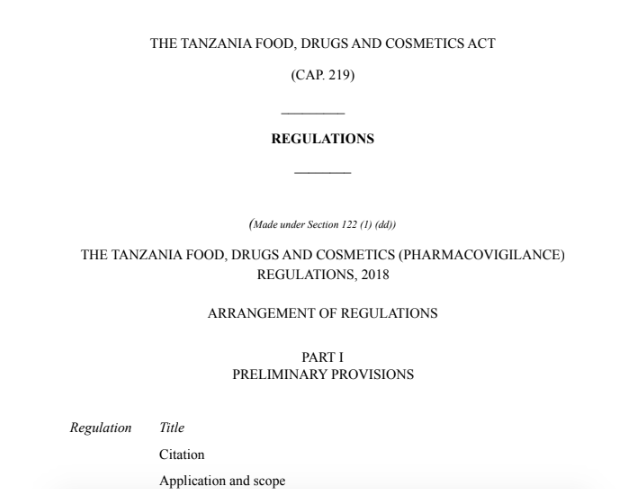Fill out the form below to receive the complete PDF guide directly in your inbox. This resource provides clear, step-by-step guidance to help you make the most of the information we’ve prepared for you.
Tanzania
THE TANZANIA FOOD, DRUGS AND COSMETICS (PHARMACOVIGILANCE) REGULATIONS, 2018
These 2018 Regulations, made under the Act, establish a detailed, mandatory pharmacovigilance (PV) framework. They mandate the creation of the National Pharmacovigilance Centre and a Pharmacovigilance Technical Committee to oversee the system. The regulations impose strict requirements on MAHs and manufacturers to establish their own PV quality systems, including a PV System Master File (PSMF) and a designated focal person. They also define the responsibilities of health facilities, public health programs, and the procedures for PV inspections.

Use Cases
- Manufacturers and MAHs – Establish and Maintain a PV System: They must establish and operate a dedicated pharmacovigilance quality system, including a designated focal person for PV matters.
- National Pharmacovigilance Centre – System Establishment and Function: It is the central authority established to manage the PV system, ensuring all functions are carried out effectively.
- Pharmacovigilance Technical Committee – Technical Oversight: The Committee is established to provide technical guidance and support to the PV system.
- Patients or Consumers – Directly Report Adverse Events: Patients and consumers have the designated requirement to report adverse drug reactions and events.
- Health Facilities – Fulfill PV Responsibilities: Health facilities and pharmaceutical outlets have specific responsibilities defined in the regulations regarding PV.
- MAHs/Focal Persons – Maintain the PSMF: They must ensure the Pharmacovigilance System Master File (PSMF) is maintained and accurately reflects the structure and functioning of their PV system
Key takeaways you'll learn
The resource’s purpose is to legally enforce a comprehensive, quality-system-based approach to pharmacovigilance in Tanzania, defining roles and responsibilities from the central regulatory body down to patients and marketing authorization holders.
- Legal Force: These are formal Regulations (2018) made under the Tanzania Food, Drugs and Cosmetics Act.
- Quality System Mandate: The Regulations mandate the establishment of a Pharmacovigilance Quality System and adherence to Good Pharmacovigilance Practice (GVP) for MAHs.
- Required Documentation: MAHs must maintain a Pharmacovigilance System Master File (PSMF) and a Pharmacovigilance Master Plan.
- Decentralized Roles: The regulations define the PV responsibilities for various stakeholders, including health facilities, pharmaceutical outlets, Council and regional health management teams, and public health programs.
- Patient Empowerment: The Regulations explicitly detail the requirements for Patients or consumers for reporting adverse drug reactions and events, including the use of a Patient Adverse Drug Reaction Alert Card.


